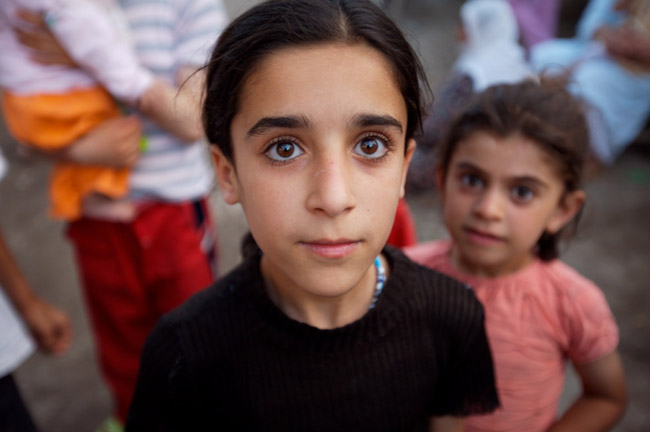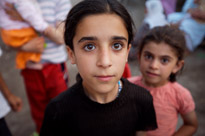Turkey 2007: Burned Houses and Gas Station Weddings
Jun 18, 2007
Above: Kids pose for a photo in the street in Bismil, Turkey.
// Dig Update //
Well sweet things are finally happening in my trench now that we are pushing the end of the season. I am in the process of excavating a collapsed house that burned down in the Ubaid period (about 6500 years ago). It is incredible, as the fire that destroyed the house left everything almost perfectly preserved. Through the material we have already excavated, we have been able to determine the order of collapse from roof caving in, to walls collapsing. We are just now getting through the collapse layer, so we should be getting some really cools stuff coming out within the next few days.
Last weekend we had our annual trip to Hassankeyf - a kurdish town that is going to be completely submerged by the Tigris when Turkey builds a dam that it has been discussing for years. The trip was very relaxing as usual and we found a new hidden jewel this year... We usually just hang out in the cabanas in / on the water, however the flash floods this past winter had actually washed them all away! They were in the process of rebuilding, but instead we found this awesome cave restaurant and just lounged around drinking beer, smoking hookah, and eating all day. It was great...
I also purchased another carpet while in Hassankeyf that I have to figure out how to get home... And one the babysitters for my professor's daughter had recently taken me to a carpet making factory where she used to work in Bismil (the town I live in) and so I asked her if she could make me one also... Well today, I see her and her sister and they give me an awesome carpet that, while she hadn't made it herself, was nonetheless made here in town by one of her friends! So now I have two carpets to figure out how to get home!
// Kurdish Living //
One of my main goals for this season was to capture the Kurdish style of life in the region through photography. The exhibit that I am going to produce has already take wings, with four potential galleries wanting to show it spanning Los Angeles, San Fransisco, Utah, and New York. The director of the excavation has also already agreed to give an adjoining lecture in at least one of the locations and I am hoping to put together a panel to discuss the relationship between Tukey and it's Kurdish population.
Since all of our workmen are from the various surrounding villages, I am lucky enough to have some great access to the region as well as guides... It has been a very interesting experience being welcomed into the homes and lives of these villages. If you're interested, here are some of the highlights...
Men vs. Women:
First off the villages are still very firmly rooted in "traditional" roles for men and women. Pretty much every house I visited, the men hung out in one room while the women cooked / did their own thing in their own part of the house. For one meal, we (the men) actually hung out in one room and came out to a perfectly prepared meal awaiting us on the floor (yes they eat on the floor in the villages - it is actually pretty comfortable) without anyone around. After the meal we went back in to other room while the women came in and cleaned up. I screwed things up for them though when I went back through to go to the bathroom and they immediately put their heads down and started scurrying into a side room. That was probably the most traditional of the villages I visited though - Eski (old) Choletepe as it is called. This is part of the main village of Choletepe, a village that consists of about 80 families. I also visited, Sari Koy a village of 12 families and Kenan Koy, one made up of about 8.
Each household I visited in the villages had a different feel however. While I already described one in Eski Choletepe, a house I had dinner at in Yeni (New) Choletepe was far different. The women still did the cooking and the meal prep, however they were much more present throughout and I felt comfortable enough here to ask to go take photos of the one woman preparing dinner. In general I felt much more relaxed. That was until the father of the household came home... At that point, the joking stopped, the 3 year old daughter was put into a nice dress, and the formal speak came out.
Chok (a lot of) Children:
One of the biggest problems in the Kurdish lifestyle is the large population of children. Each family - on average - has about 10 kids. One of the really interesting things I have observed is the relationship between adults and their children. First off, every man I talked to told me how much of a problem the number of kids running around was, however, each one still answered yes when I asked if they wanted to have ten kids. When I asked why, I would get varying responses such as "We need soldiers" or "there is a lot of work." The men also treated the kids like any other bothersome animal in the village - they would throw rocks at them or make noises to get them to go away. But at the same time, the men used any young boy around as a virtual on-demand servant to get tea or snacks on a moments notice. Overall, the men are very cold towards the children, especially the young boys and definitely do not welcome them to the mens club. The women are a lot different with their children however. First of all, they are incredibly proud of their babies and it shows. Second, they are much more welcoming to the young girls. They still have to act as servants when the women need something, however I have noticed more of an inclusive attitude towards them being welcomed as part of the group and even treated as a young friend.
Women still doing the work:
Work in the villages is pretty interesting. Apparently there is very little of it to go around for the men, and they generally end up leaving to go work in larger cities in Turkey. Women once again however do most of the work. Young teenage girls are transported by the tractor load everyday to work the fields. One of the men that runs one of these crews was a workman of mine a few years back and was happy to see me when I stopped by. He let me hang out for an afternoon and ride back to town with the tractor and crew. I've gone out to the fields a couple times now so I have become a familiar face, as the women - actually both young and old - do their backbreaking work for a mere 14 Lira - $10 USD / day.
My first Turkish wedding happened to be in a gas station:
Weddings here are a three day long party and last night I got to go to one of the villagers receptions for his wedding. It was kind of funny because all the "Salons" or reception halls around here seem to be connected to a gas station, so when I was first invited I was really confused when I was told to go to the Petrol Ofisi! It was pretty fun though and it was nice to be welcomed by more villagers than just our workmen since I have now been getting to know various people throughout the community.
Most of all, I was just overwhelmed by the level of hospitality I experienced in the villages. Everyone welcomed me in and I probably had 20 glasses of tea in the two or three day I have spent traveling around. One of the coolest things about working on excavations like this is knowing that I can come back in 10 or 20 years, and (if the villages are even still there) walk into a little village in Southeast Turkey and be welcomed with open arms.
Anyways, more later... I have to get some sleep... I have a house to excavate tomorrow! Check out the new photos I put up by clicking on the photo gallery link on the right hand side of the page...

All images and content © 2010 Jon Vidar. All rights reserved. Web site made possible by Movable Type, PhotoShelter, and Media Temple.

Leave a comment